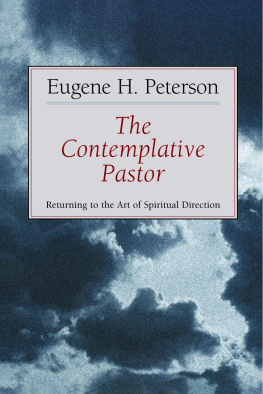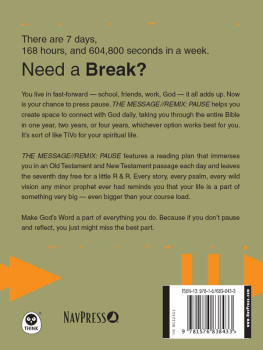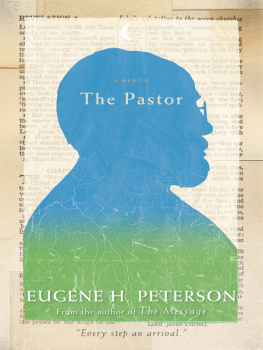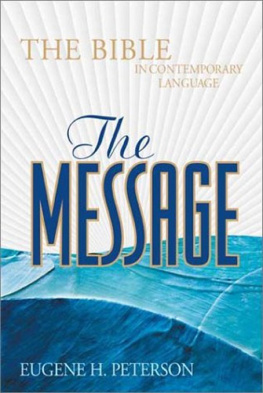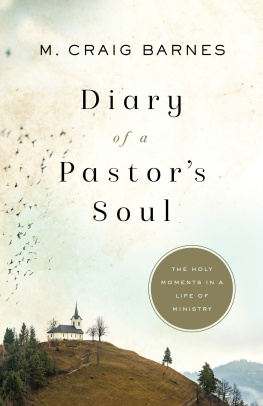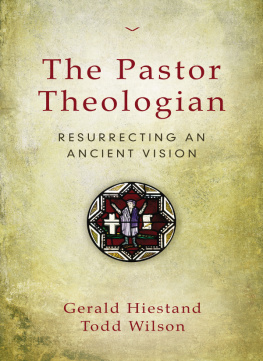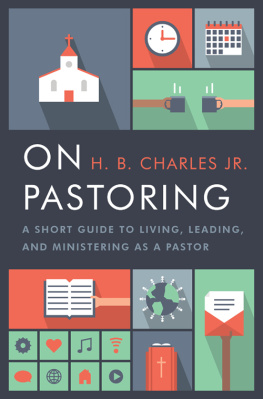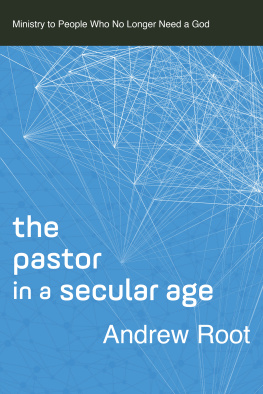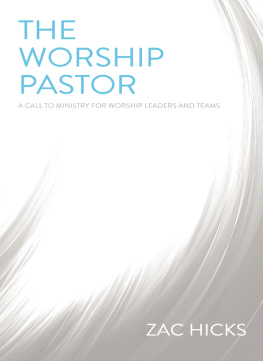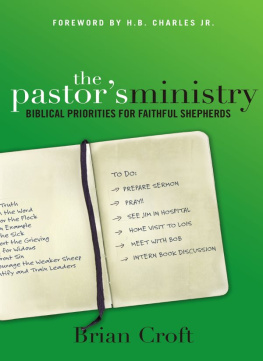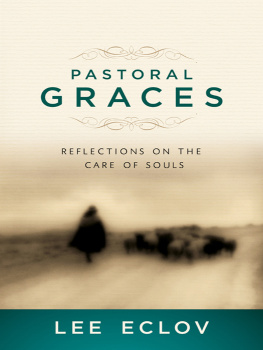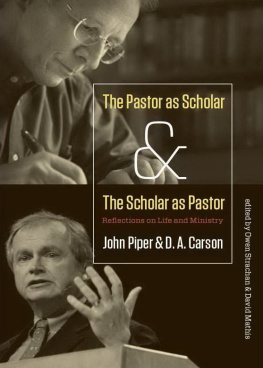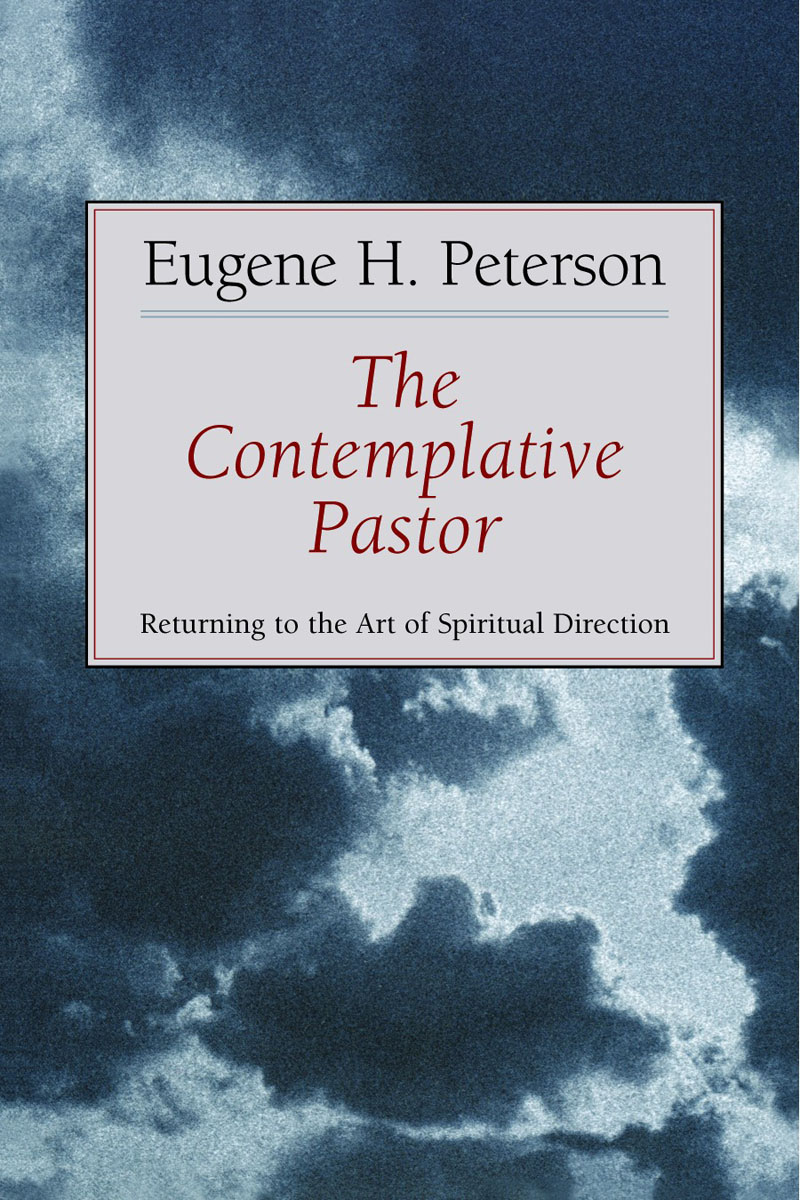

1989 Eugene H. Peterson
All rights reserved
This edition published 1993 by
Wm. B. Eerdmans Publishing Co.
2140 Oak Industrial Drive N.E., Grand Rapids, Michigan 49505
Published in association with the literary agency of
Alive Communications
Goddard Street, Suite 200
Colorado Springs, CO 80920
Printed in the United States of America
23 22 21 20 19 18 17 23 24 25 26 27 28 29
Library of Congress Cataloging-in-Publication Data
Peterson, Eugene H., 1932
The contemplative pastor: returning to the art of spiritual direction / Eugene H. Peterson.
p. cm.
ISBN 978-0-8028-0114-2 (paper)
1. Spiritual direction. 2. Pastoral theology. 3. ClergyOffice.
4. Peterson, Eugene H., 1932- . I. Title.
BV5053.P48 1993
253.53dc20 93-4937
CIP
Unless otherwise noted, Scripture quotations are from the Revised Standard Version of the Bible, copyrighted 1946, 1952 1971, 1973 by the Division of Christian Education of the National Council of the Churches of Christ in the U.S.A., and used by permission.
For H. James Riddell
Contents
Foreword
I F Eugene H. Peterson were not a Presbyterian, he might be a monk. His best-known books, from A Long Obedience in the Same Direction to Traveling Light to Earth and Altar [republished under the title Where Your Treasure Is], deal with the practice of Christian spirituality.
And Eugene is of a monastic demeanor. He is bearded, balding, and thin. He has a quiet, raspy voice that sounds as if it belongs to a man who has weathered many dark nights of the soul. His is the settled and serene air that comes from facing and overcoming our innate fear of silence and solitude, so that when he speaks, the coarse, gentle words seem to rise from a genuine depth.
But monastic demeanor aside, Peterson is a thoroughgoing Protestant, enough so to be pastor of Christ Our King Presbyterian Church in Bel Air, Maryland. He decided early in his work never to pastor a church composed of more people than he could remember by name. He and his wife, Jan, have been at Christ Our King, a congregation of some 300 members, for twenty-six years.
Beginning especially with the 1980 publication of A LongObedience, Eugene has earned a widespread (if appropriately low-key) reputation as a thoughtful, articulate pastor who understands the spiritual disciplines and can communicate their practice.
He pastors and writes from a scholarly background, having mastered the biblical languages and done doctoral-level work with the magisterial William F. Albright. But none of the learning is for show. Peterson is, in fact, uncomfortable with persistent questions about his books, insisting that his identity and aim in life is merely being a dependable pastor. In a world of mounting hype and glitter, he has dedicated himself to the unsung promotion of honesty, simplicity, and substance.
In September 1987, I spent three days with Eugene and Jan, but not in Bel Air. Rather, I visited them at his deceased parents home in northwest Montana, during Eugenes year-long sabbatical. (Eugenes reflections on his sabbatical are in ). The house is situated off a bay on Flathead Lake, a blue mirror of the wide sky that stretches ten miles behind the house. The white-peaked Rockies encircle the lake. Eugenes appreciation is obvious. One evening he stood in the kitchen, the lakes shimmering light reflected onto the ceiling by the low sun. Hands shoved in the pockets of his jeans, he stared out the window and muttered to no one in particular, I love the sensuality of this place.
The Petersons stayed in Montana until October, spending leisurely hours in prayer, hiking in the surrounding mountains, reading aloud together, skiing cross country, Eugene writing and Jan typing the successive drafts of two books. Their time alone together precious enough for any ministerial couple was punctuated by visits from their children, Karen, Eric, and Leif.
September was the ideal time for an interview. Eugene was refreshed from the sabbatical, geared up to return to his pastoral work, and ready to talk. We spent hours in front of a tape recorder, but also roamed the mountains near the house, with Eugene taking time to discuss geological formations, relate Indian legends about fir cones, and point out an endless succession of wildlife. But whatever turns the conversation took, it returned over and over to the themes of spirituality: the importance of place, the role of creativity, the centrality of community, and the necessity of Christian subversion. Asked what draws it all together, Eugene, with a fish hawk winging across the bay at his back, quoted the last line of Bernanoss Diary of a Country Priest: Grace is everywhere.
Spirituality and Place
The person who looks for quick results in the seed planting of well-doing will be disappointed. If I want potatoes for dinner tomorrow, it will do me little good to go out and plant potatoes in my garden tonight. There are long stretches of darkness and invisibility and silence that separate planting and reaping. During the stretches of waiting there is cultivating and weeding and nurturing and planting still other seeds.
Traveling Light
Your books are earthy, in the literal sense of the word. There are agricultural metaphors, titles like Earth and Altar. Although we live in a highly mobile society, you seem to have a strong sense of place, of the importance of ones location.
I enjoy reading the poet-farmer Wendell Berry. He takes a small piece of land in Kentucky, respects it, cares for it, submits himself to it just as an artist submits himself to his materials. I read Berry, and every time he speaks of farm and land, I insert parish. As he talks about his farm, he talks about what Ive tried to practice in my congregation, because one of the genius aspects of pastoral work is locality.
The pastors question is, Who are these particular people, and how can I be with them in such a way that they can become what God is making them? My job is simply to be there, teaching, preaching Scripture as well as I can, and being honest with them, not doing anything to interfere with what the Spirit is shaping in them. Could God be doing something that I never even thought of? Am I willing to be quiet for a day, a week, a year? Like Wendell Berry, am I willing to spend fifty years reclaiming this land? With these people?
Christian spirituality means living in the mature wholeness of the gospel. It means taking all the elements of your life children, spouse, job, weather, possessions, relationships and experiencing them as an act of faith. God wants all the material of our lives.
What does it mean to experience all the material of our lives as an act of faith?
That Im responsible for paying attention to the Word of God right here in this locale. The assumption of spirituality is that always God is doing something before I know it. So the task is not to get God to do something I think needs to be done, but to become aware of what God is doing so that I can respond to it and participate and take delight in it.
When I immerse myself in my parish, I oftentimes come home amazed at whats going on in peoples lives. And its not that theyre not sinners. They live and they sin and they rebel and do stupid things, but the courage and the grace are there almost every day. When Im doing my work that is, when I dont stand detached, but just dive into my own environment I think my characteristic feeling at the end of the day is a sense of awe about what God is doing with these people.
Next page
